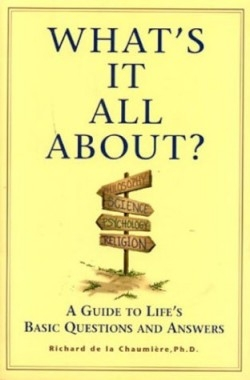What's It All About?
A Guide to Life's Basic Questions and Answers
“We are tiny creatures living in a vast cosmos,” writes the author. “With a reflective consciousness unparalleled among other species on our planet, we ask foundational questions about our existence and the universe.” De la Chaumière provides his readers with a scholarly questioning and perspective on contemporary civilization. A licensed psychologist, he is learned in the far-ranging pursuit of influential discoveries and theories that extend knowledge of the self, the civilized world, and the cosmos as far as it has gone—to date.
His engaging, informational style creates a backdrop for honest confrontation of reality and purpose. Anyone with expertise in one area is unlikely to excel elsewhere, but this author manages to pull off an unapologetic and considerably well-balanced understanding of many fields.
His book brings up questions asked since time memorial, even repeatedly throughout a single life. Whether historical, classical, religious, or personal—the ways of knowledge and purpose are proffered, shifting from individual to world views, from ancient commentary to modern, to theories on cosmology, physics, biology, and nature. Reading this fascinating book is like having a college education brought up to the twenty-first century.
The author’s goal is to better equip those on truth-seeking paths to choose for themselves. Readers may take issue with bits and pieces, yet no doubt, the author would rejoice in such engagement. He states: “we are the stewards of our own spirits.” Indeed, de la Chaumière takes on Socrates’s mantle in his question-and-answer investigation and cooperative inquiry. Like the Athenian, he is for process, not finished systems.
“The primary instrument for our inquiries is ourselves,” he writes. “Who we are powerfully impacts the questions we ask, the way we go about our quest, and the kinds of answers we find true and meaningful.” The search for truth engages five senses, a three-pound brain, and nine basic human needs-biological survival, relationship, self-esteem, self-reliance, work, love, play, purpose, and self-realization—all dynamically interrelated. The process works best, de la Chaumière would say, when people respect each other’s beliefs, and cooperate with each other as imperfect creatures.
In the attempt to most accurately understand reality and create lives of greater truth, good, and beauty, any help is desirable. This work, highly suitable for educated and non-educated truth-seekers, is one such generous and balanced effort.
Disclosure: This article is not an endorsement, but a review. The publisher of this book provided free copies of the book to have their book reviewed by a professional reviewer. No fee was paid by the publisher for this review. Foreword Reviews only recommends books that we love. Foreword Magazine, Inc. is disclosing this in accordance with the Federal Trade Commission’s 16 CFR, Part 255.

